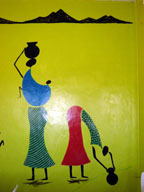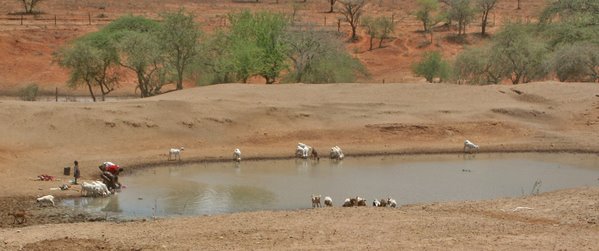
In Nairobi, Caryn (me) and Steve (a US intern with Church World Service in Nairobi) spent time with the women of the Women and Children in Strength Program in Mathare Valley slum. Regional Coordinator of the Nairobi Region Phyllis Kamau of the National Council of Churches of Kenya (NCCK) spoke with us and told us about the women and the program.
Briefly, this is a small micro enterprise program, which engages 120 women who live in the slums of Mathare and Huruma. NCCK, which i the local partner that Church World Service (CWS) supports there, provides small loans to the women so thay can start businesses of their own. They must pay back the loans by making regular payments of a small amount. This is very difficult for these women, who can barely buy food for themselves and their families. It has been very difficult for some to understand the concept of a loan. But, the discipline of making payments make it easier for them as time goes along. NCCK and CWS walk alongside these women, training them to run their businesses, helping them with issues and advising them.
Phyllis then introduced us to the women. Caryn and Steve then introduced themselve. Here's what Caryn said,
I am Caryn. I am from Colorado in the United States of America where we have had many feet of snow this year. I am happy to see the green of Kenya and to hear the birds singing. Last year, my husband Peter visited you. I want to thank you for your hospitality to him and to his group. I wasnt to thank you for the lovely goods you sent home with Peter. I want to thank you for the three outfits you made for me. I have worn them in the US and have had many compliments on them. I thank God for bringing us to Kenya. I asked him for a word to bring to you. After a time I received Phillipians 14:3: I can do all things through Christ who strengthens me. Now, I look forward to hearing your stories. God bless you. Asante sana.
Phyllis translated for me, introduced Steve, who also spoke, then we began interviewing the women, who were reluctant at first to come forward, but soon were eager to visit with us, offering their stories and their hopes for the future. I will share their individual stories with you in the future, but here I would like to say that these women start having success and then start dreaming dreams. Some of the dreams I heard from them were to send their children to secondary school and to university, to buy a plot of land and to subdivide it for the women so they don't have to pay "house rent", to go and bring goods from Uganda and Tanzania to sell in Kenya, to own and operate bigger businesses with better equipment, to help and educate all the children of the slums, and to grow out of the slums. Some of the needs they mentioned were a need for marketing of their goods and a need for help with school fees for their many children.
Peter went with Andrew and Mary to the National Environmental Management Authority of Kenya where this time they were able to meet with two officials (unlike yesterday, where we were waiting for an hour and did not see anyone). Although reluctant to share any documents or copy anything for us, these officials outlined procedures for doing environmental assessments (EAs) for water projects, including the need to hire consultants for larger projects. Fortunately, thsecond official indicated that most of the projects were small enough that no formal EA would be needed and that local district officials were available to help with expertise. "For small communities and NGOs , we do not want the EA to cost more than the project itself," he said. This was very disappointing news to a consultant like Peter. :)
When Peter returned to WCIS program, we bought small items from the women for Art at the CWS Rocky Mountain Office. Peter bargained well. Caryn did not. :)















 Today we started out with Andrew and Tammy Mott, director of South Africa office of CWS, to Nairobi office of CWS. There we went over plans for the next several days with CWS staff members. Looks like a good plan!
Today we started out with Andrew and Tammy Mott, director of South Africa office of CWS, to Nairobi office of CWS. There we went over plans for the next several days with CWS staff members. Looks like a good plan!


